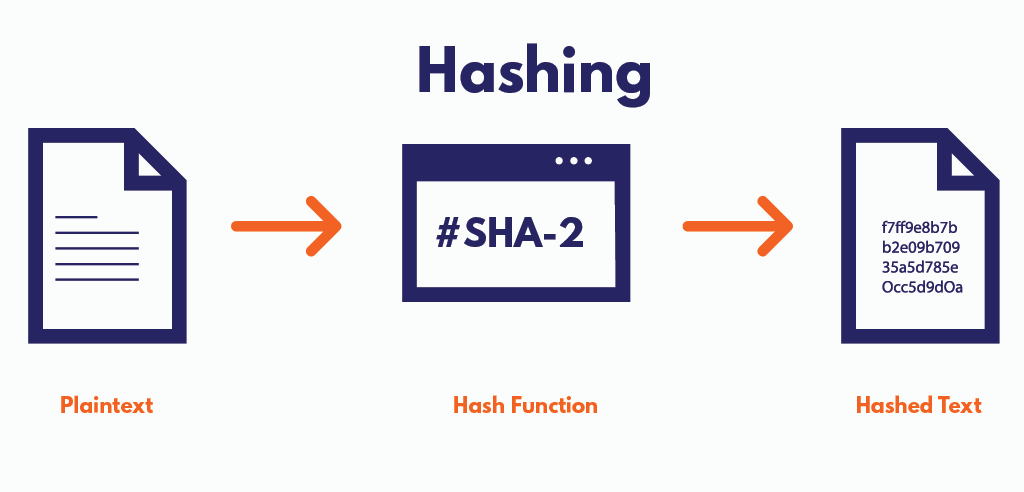Blockchain technology has revolutionized many industries with its secure and transparent way of recording data. But what lies at the heart of this security? The blockchain hashing technology.
Hashing functions play a critical role in safeguarding the integrity of data on a blockchain. But how exactly does a hash secure blockchain technology? We’ll see shortly, and also learn/explore how this powerful tool keeps your data tamper-proof.

What is a Hash?
Imagine a hash function as a digital fingerprint machine. You feed it any data (text, image, file) – the input – and it spits out a unique string of characters called a hash. This hash is like a summary of the data, but with a crucial twist: it’s nearly impossible to recreate the original data from just the hash.
Here’s the magic: even the slightest change to the input data will result in a completely different hash. This property makes hashing ideal for ensuring data integrity.

The Importance of Hashes in Blockchain
Now, let’s see how hashing secures blockchain technology. Here are three key ways:
- Immutability: Blockchains are like chains of information blocks, where each block contains data (like transaction details) and a hash. The twist? Each block also holds the hash of the previous block. This creates a tamper-evident chain. If someone tries to alter data in a block, the hash of that block will change. But since the hash of the previous block is also stored within it, changing one block would require altering all subsequent blocks and their hashes – a near-impossible feat with a large and distributed blockchain network.
- Verification: Anyone can download a copy of the blockchain and verify its integrity. They can simply recalculate the hash of each block using its data and compare it with the stored hash. If they match, it confirms the data hasn’t been tampered with. This transparency fosters trust in the system.
- Security: Hashes act as a shield against malicious actors. Since it’s computationally infeasible to reverse-engineer the original data from a hash, forging transactions or tampering with data becomes incredibly difficult. This strengthens the overall security of the blockchain.
In Conclusion
Hashes are the silent guardians of blockchain technology, ensuring data integrity and immutability. Their one-way nature and sensitivity to change make them a powerful tool for securing this revolutionary technology. So, the next time you hear about blockchain, remember the critical role that hashing plays in safeguarding its core functionalities.

FAQ on Blockchain Hashing Technology
1. What is a hash function, and how does it relate to blockchains?
Imagine a hash function like a fingerprint scanner for data. It takes any kind of information and creates a unique code, like a digital fingerprint, called a hash. This hash is almost like a summary of the data, but with a special twist: it’s very difficult to recreate the original data just by looking at the hash.
In blockchains, hash functions play a vital role in keeping information secure. Each block of data in a blockchain contains a hash, and crucially, each block also holds the hash of the block before it. This creates a chain where tampering with any data would be nearly impossible.
2. How do hashes ensure immutability (unchanging data) in blockchains?
Blockchains are like chains made of information blocks. Each block stores data and a hash. Here’s the clever part: each block also contains the hash of the previous block. This creates a tamper-proof chain. If someone tries to change data in a block, the hash of that block would change. But since the hash of the previous block is also stored within it, changing one block would require altering all the blocks after it and their hashes too – a very difficult task on a large and spread-out blockchain network.
3. Can anyone verify the integrity of a blockchain?
Yes! Because of hashing, anyone can download a copy of the blockchain and check its integrity. They can simply recalculate the hash of each block using the data in that block and compare it with the stored hash. If they match, it confirms the data hasn’t been tampered with. This transparency builds trust in the system.
4. How do hashes protect blockchains from security threats?
Hashes act like a shield against malicious actors. It’s very hard (practically impossible) to reverse-engineer the original data from a hash. This makes forging transactions or altering data incredibly difficult. This strengthens the overall security of the blockchain technology.
5. What’s the main benefit of using hashes in blockchain?
Hashes ensure the integrity of data on a blockchain. They guarantee that the information hasn’t been changed since it was added. This immutability is a core feature of blockchain technology and makes it so secure and trustworthy.
6. Is there anything else besides hashing that keeps blockchains secure?
Absolutely! Hashing is a vital piece of the puzzle, but other factors like cryptography and consensus mechanisms also play a role in securing blockchains.
7. Where can I learn more about blockchain technology?
There are many resources available online to learn more about blockchain technology. A good starting point could be a search for “blockchain technology explained” or “how does blockchain work”.
-

Precious Gabraels (Precious Okechukwu Nwosu) is a tech enthusiast. A professional Web Developer, Blogger, SEO Specialist, and Digital Marketer. He is also a co-founder of Nova Vamp Web Design Consultancy which specializes in the digitization of businesses.
View all posts
Tags: blockchain blockchain hash hash hashing













